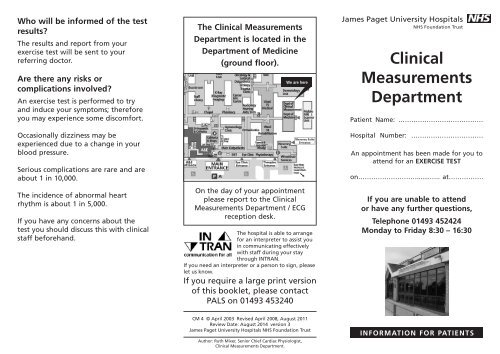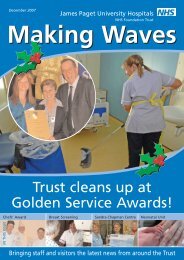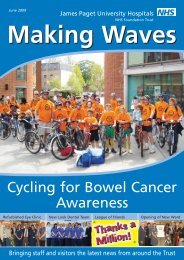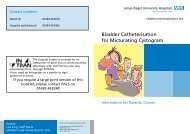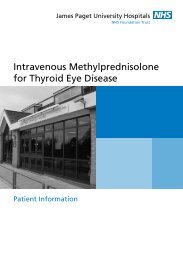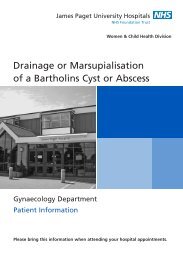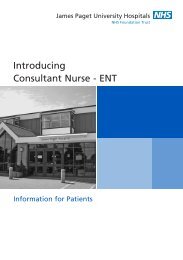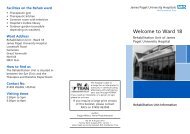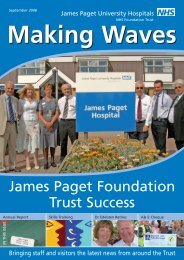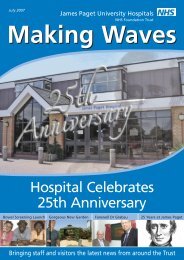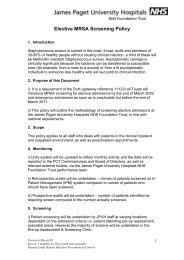Clinical Measurements Department - James Paget University ...
Clinical Measurements Department - James Paget University ...
Clinical Measurements Department - James Paget University ...
Create successful ePaper yourself
Turn your PDF publications into a flip-book with our unique Google optimized e-Paper software.
Who will be informed of the test<br />
results?<br />
The results and report from your<br />
exercise test will be sent to your<br />
referring doctor.<br />
Are there any risks or<br />
complications involved?<br />
An exercise test is performed to try<br />
and induce your symptoms; therefore<br />
you may experience some discomfort.<br />
Occasionally dizziness may be<br />
experienced due to a change in your<br />
blood pressure.<br />
Serious complications are rare and are<br />
about 1 in 10,000.<br />
The incidence of abnormal heart<br />
rhythm is about 1 in 5,000.<br />
If you have any concerns about the<br />
test you should discuss this with clinical<br />
staff beforehand.<br />
The <strong>Clinical</strong> <strong>Measurements</strong><br />
<strong>Department</strong> is located in the<br />
<strong>Department</strong> of Medicine<br />
(ground floor).<br />
We are here<br />
On the day of your appointment<br />
please report to the <strong>Clinical</strong><br />
<strong>Measurements</strong> <strong>Department</strong> / ECG<br />
reception desk.<br />
The hospital is able to arrange<br />
for an interpreter to assist you<br />
in communicating effectively<br />
with staff during your stay<br />
through INTRAN.<br />
If you need an interpreter or a person to sign, please<br />
let us know.<br />
If you require a large print version<br />
of this booklet, please contact<br />
PALS on 01493 453240<br />
<strong>James</strong> <strong>Paget</strong> <strong>University</strong> Hospitals<br />
NHS Foundation Trust<br />
<strong>Clinical</strong><br />
<strong>Measurements</strong><br />
<strong>Department</strong><br />
Patient Name: …………………………………<br />
Hospital Number: ……………………………<br />
An appointment has been made for you to<br />
attend for an EXERCISE Test<br />
on……………………….......….. at…………….<br />
If you are unable to attend<br />
or have any further questions,<br />
Telephone 01493 452424<br />
Monday to Friday 8:30 – 16:30<br />
CM 4 © April 2003 Revised April 2008, August 2011<br />
Review Date: August 2014 version 3<br />
<strong>James</strong> <strong>Paget</strong> <strong>University</strong> Hospitals NHS Foundation Trust<br />
Author: Ruth Mixer, Senior Chief Cardiac Physiologist,<br />
<strong>Clinical</strong> <strong>Measurements</strong> <strong>Department</strong>.<br />
Information for PATIENTS
What is an Exercise Test?<br />
An exercise test is an<br />
electrocardiogram (ECG) that is<br />
recorded whilst you walk on a<br />
treadmill. It allows an assessment to<br />
be made of your heart’s response to<br />
exercise.<br />
Why does the doctor want me to<br />
have an Exercise Test?<br />
This test can help discover if your<br />
symptoms are heart related.<br />
You may have already been diagnosed<br />
with angina. This test can give your<br />
doctor more information to help plan<br />
your treatment.<br />
You may be referred for an exercise<br />
test following a heart attack to help<br />
the doctor assess how well your<br />
heart has recovered. It can also help<br />
to decide what level of exercise is<br />
suitable for you as part of your cardiac<br />
rehabilitation programme.<br />
How long does the Exercise Test<br />
last?<br />
The test usually lasts between 20 – 30<br />
minutes. This includes a preparation<br />
and recovery period.<br />
After the test you may be asked to rest<br />
in the department for a further 30 – 60<br />
minutes.<br />
Preparation for the Exercise Test<br />
Please bring a list of your current<br />
medication with you.<br />
Although you are not required to wear<br />
any particular clothing it is advisable to<br />
wear comfortable, flat shoes.<br />
Continue taking your usual medication<br />
unless your referring doctor has<br />
directed you otherwise.<br />
What does the test involve?<br />
A Cardiac Physiologist will connect<br />
you to the ECG monitor. It may be<br />
necessary to remove hair from your<br />
chest so that a good recording can<br />
be taken. Your blood pressure will<br />
also be recorded at various intervals<br />
throughout.<br />
There will be two members of clinical<br />
staff with you as you walk on the<br />
treadmill.<br />
The treadmill will start very slowly.<br />
As the test progresses the speed and<br />
incline will increase, making it feel as<br />
though you are walking up a hill.<br />
If you experience any symptoms, even<br />
if only mildly, you need to inform the<br />
clinical staff.<br />
The clinical staff will stop the treadmill<br />
by gradually slowing it down when<br />
they have sufficient information, or if<br />
you are unable to continue.


